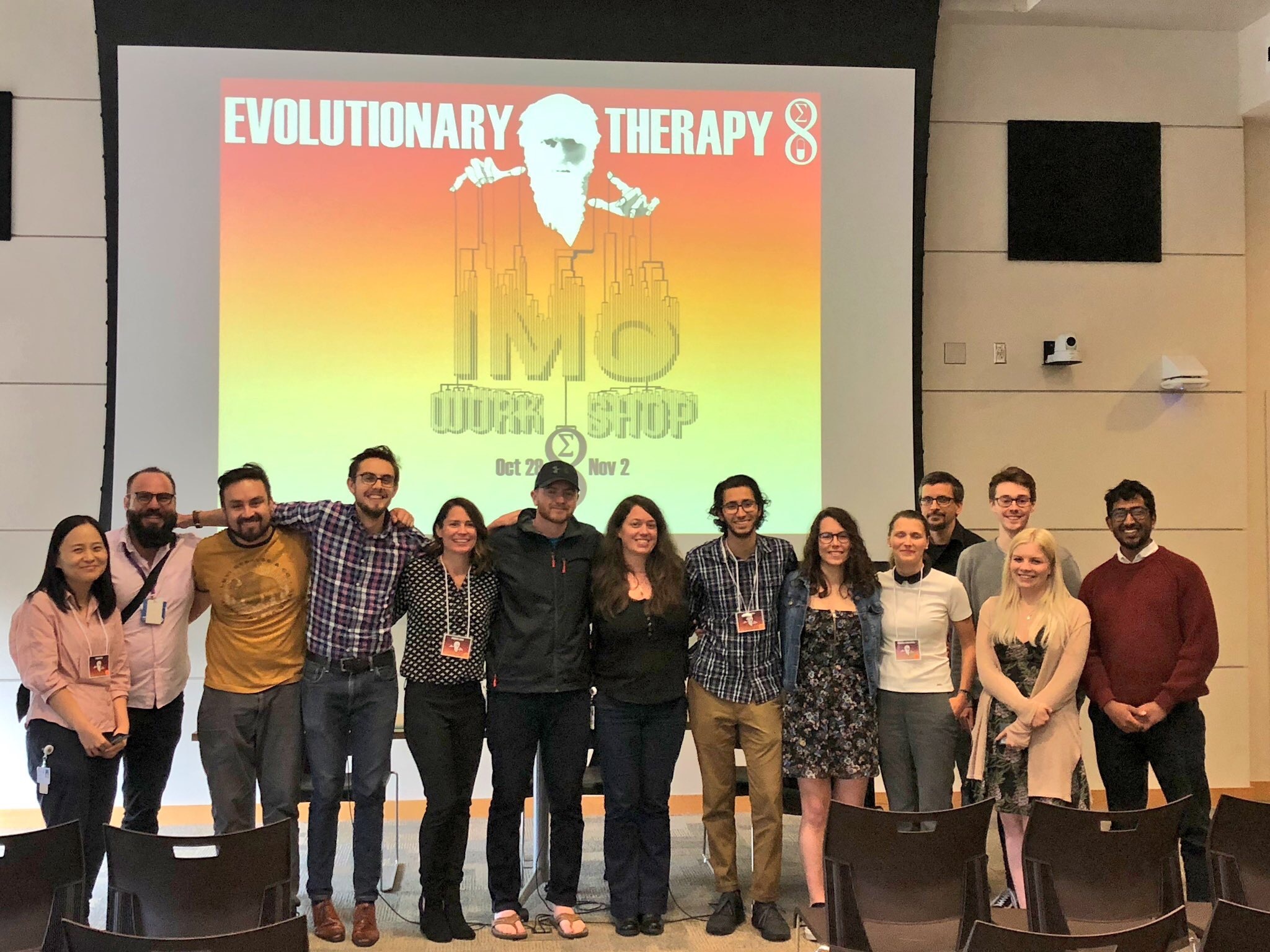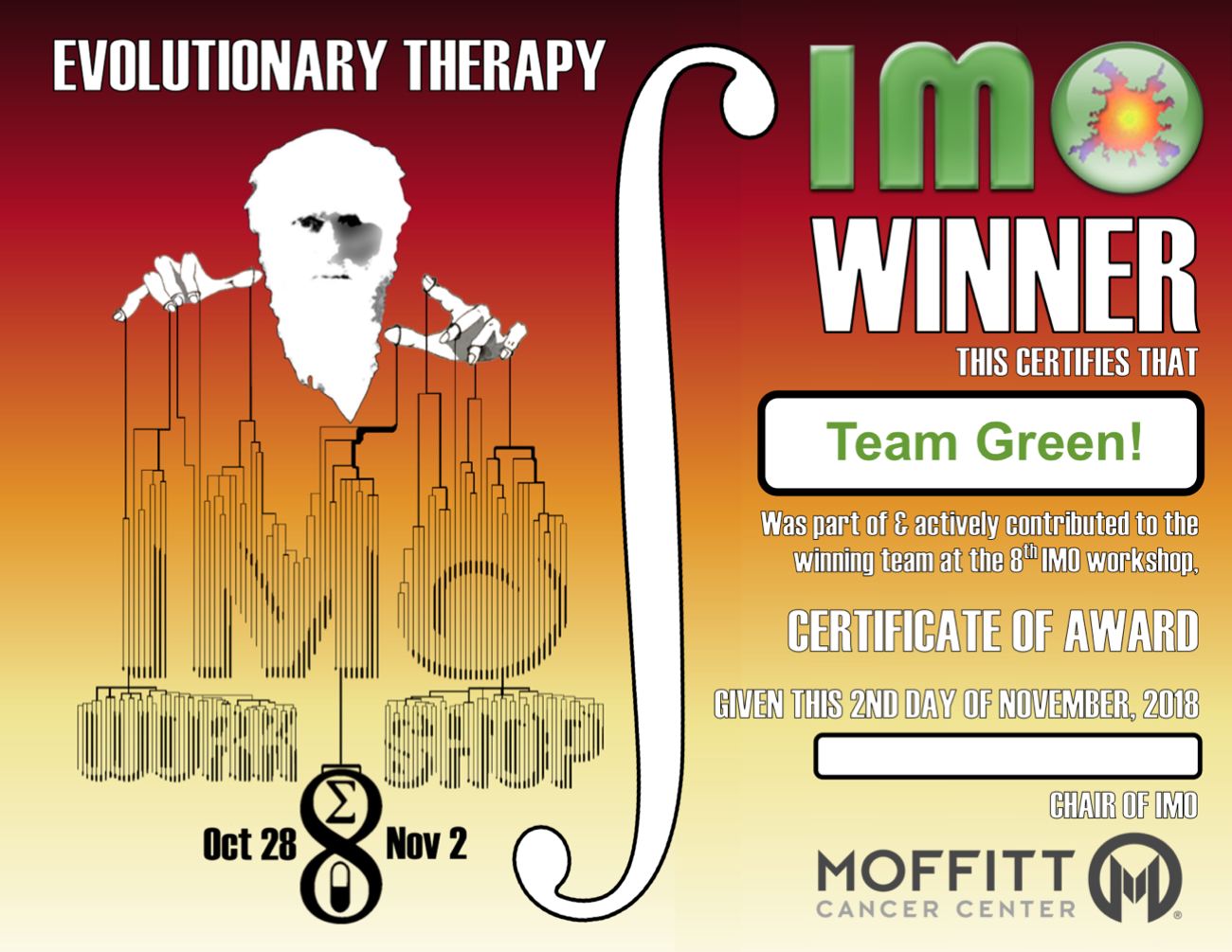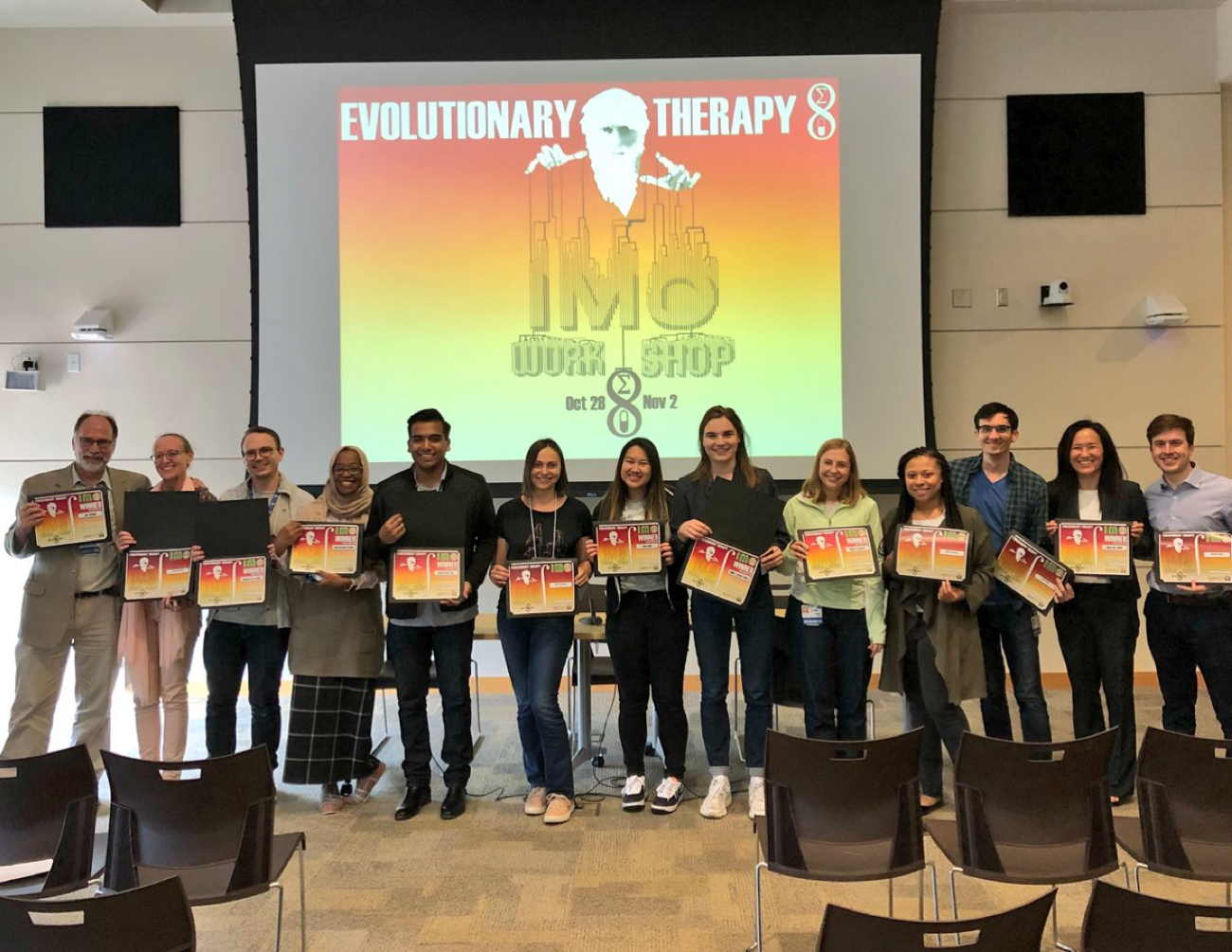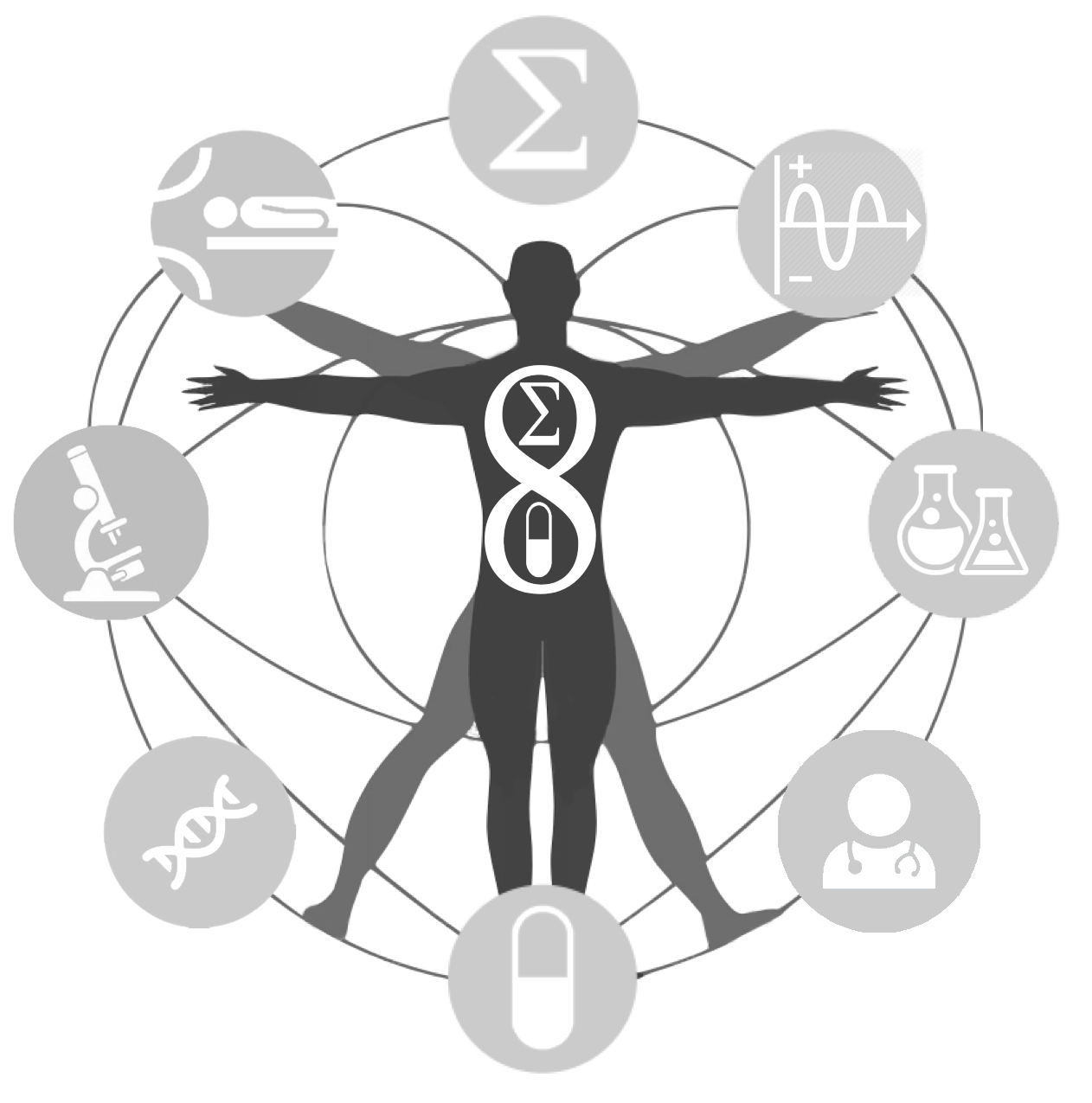IMO 8: Evolutionary Therapy

Evolutionary Cancer Therapy
Despite major advances in cancer therapies, most metastatic cancers remain fatal because tumor cells have a remarkable capacity to evolve drug resistance, both through genetic and non-genetic mechanisms. A common maxim in cancer treatment is to “hit hard and fast” through dose-dense strategies that administer the highest possible drug dose in the shortest possible time period. The maximum tolerated dose (MTD) principle has been the standard-of-care for cancer treatment, however, it has not resulted in consistent cures in patients with disseminated cancers. An evolutionary flaw in this MTD strategy is the assumption that resistant populations are not present prior to therapy. It is now clear that cancer cells can be insensitive even to treatments that they have never encountered before. Therefore, MTD therapy that is designed to kill as many cancer cells as possible, although intuitively appealing, may be evolutionarily unwise. When high doses of drug are applied continuously, competitive release allows rapid emergence of resistant populations because of the combination of intense selection pressure and elimination of all potential “sensitive” competitors. An approach we have pioneered at Moffit is to deliver the minimum effective dose (MED) by only treating a subset of the tumor, ensuring that a drug-sensitive population is left behind when treatment stops, and allowing it to reestablish. Then, through repeated cycles of treatment, the tumor is kept under control for extended periods of time. The timing of each treatment will be specific to each cancer patient; how they respond to the initial treatment will dictate when the current treatment should stop and when the next round should begin. We have termed this approach “adaptive therapy”, where the dose and timing are adapted to each individual patient’s cancer. Adaptive therapy is a subset of a larger class of evolutionary-enlightened therapeutic approaches that embrace evolutionary principles to try and stay one step ahead of the complex evolving system that is cancer.
Presenting the Research Question
Team Red
It's question presentation time and 1st up is #TeamRed with MD Roger Li doing the honors #MoffittIMO pic.twitter.com/kCaGCwChS9
— Sandy Anderson (@ara_anderson) October 29, 2018
Team Blue
Now #TeamBlue clinical co-lead Brandon Manley presents their question #MoffittIMO pic.twitter.com/f7v8sbVzl1
— Sandy Anderson (@ara_anderson) October 29, 2018
Team Yellow
Now a double act with @AndriyMarusyk & @annakmil present #TeamYellow question #MoffittIMO pic.twitter.com/HVYPLXiHyE
— Sandy Anderson (@ara_anderson) October 29, 2018
Team Green
Now @Sciurusniger presents #TeamGreen question, actually it's 4 questions! #MoffittIMO pic.twitter.com/joCgTqT7tS
— Sandy Anderson (@ara_anderson) October 29, 2018
Team Orange
Last but not least #TeamOrange presents their question with @luddyka & Matthew Foster #MoffittIMO pic.twitter.com/YXxa41vz5i
— Sandy Anderson (@ara_anderson) October 29, 2018
And the winner is...
Winning team: specific aims
"Designing and evaluating evolutionary therapies for advanced progressive thyroid cancer"
Click to download a pdf of the winning team's specific aims.
Background: In the U.S., thyroid cancer is the fifth most common cancer among women and the cancer growing fastest in incidence. Most patients have an excellent prognosis with a five-year survival rate > 98%. However, when advanced and metastatic (lymph nodes, lung, and bone are frequent metastatic sites), the five-year survival rate drops to around 56%. Mortality rates have changed little for several decades. Standard of care involves tyrosine kinase inhibitors (TKI). Because of the evolution of drug resistance, median time to progression or intolerable drug toxicity is about 18-20 months. Delaying the evolution of resistant clones and decreasing the toxicity profile of TKIs in patients with thyroid cancer should improve progression free survival and improve quality of life. Adaptive TKI therapy could be one such mechanism.
A phase 2 trial (MCC 19442, PI-Chung) has recently opened at Moffitt to apply an adaptive therapy to advanced-stage differentiated (DTC) and medullary (MTC) thyroid cancers, which develop in follicular and parafollicular cells, respectively. Based on the levels of distinct biomarkers for DTC and MTC, the current standard of care TKIs will be administered. The TKIs are Lenvatinib or Sorafenib in DTC and Cabozantinib or Vandetanib in MTC. Modeled after the previous prostate cancer trial with adaptive design, a TKI is administered until there is >50% reduction in the biomarker and is then withdrawn. The therapy resumes when the biomarker increases to the pre-treatment level. A separate international phase III trial on metastatic DTC (MCC 19818, Moffitt Site PI-Tarasova) proposes to evaluate the efficacy of Cabozantinib after patients have progressive disease on Lenvatinib or Sorafenib given standard continuous dosing, with the hope that cells do not have cross resistance with the preceding TKIs. Neither of these trials has been formally modelled mathematically or in silico.
We propose to provide the first eco-evolutionary model for advanced stage, metastatic thyroid cancer (both DTC and MTC) subjected to TKI therapies. We propose a core model built around a population ecology model that includes the cancer cells’ intrinsic growth rate (r), carrying capacity (K), and therapy-induced mortality. The cancer cells possess a resistance strategy that mitigates mortality from therapy at the expense of reduced r or K. Little is known regarding TKI- specific mechanisms of resistance, the costs of resistance, or the distribution of resistance strategies found within the tumors. For this reason, the core model is intended to have general properties that can be modified and expanded to consider: 1) competition between sensitive and resistant cancer clones (competitive release adaptive therapy), 2) a monomorphic cancer clone whose resistance strategy evolves along a continuum (a novel perspective on adaptive therapy), 3) a vector of resistance strategies that may be specific or general to different TKIs (appropriate for trials that sequentially use multiple TKIs), and 4) spatially-explicit histologies and potential for combining TKI and immunotherapy within the tumor immune microenvironments.
We hypothesize that: i) the model will support the conclusion that an adaptive therapy based on a 50% trigger point will be non-inferior and likely superior to continuous TKI, ii) the extended model will show how an evolutionarily informed sequential use of two different TKIs will promote a more durable response than just one, especially when each TKI requires a different resistance strategy by the cancer cells (double bind adaptive therapy), and iii) using a patient’s data to parameterize the model will permit a personalized resistance management plan.
Specific Aim 1
To develop and validate a core mathematical model of tumor progression and therapeutic response in advanced stage DTC and MTC. We will model the eco-evolutionary dynamics associated with a TKI monotherapy given continuous vs. adaptive dosing schedule. The model(s) will be parameterized using retrospective cohorts of DTC and MTC patients based on: i) the choice of TKI, ii) longitudinal biomarker levels, iii) available tumor specimens, and iv) tumor burdens determined by longitudinal radiographic scans. The model(s) will be validated using prospective cohorts treated under the adaptive trial (MCC 19442).
Specific Aim 2
To develop a core mathematical model of tumor progression and therapeutic response given a sequential therapy using two different TKIs. We will develop a model(s) of the eco-evolutionary dynamics associated with the continuous dosing schedule given a TKI monotherapy vs. a sequential therapy using two different TKIs in the retrospectively collected cohort. We will test the model(s) in the prospective cohort from treated MCC 19442 control arm and MCC 19818. In addition, we will develop a model(s) in patients with adaptive dosing schedule given a TKI monotherapy vs. a sequential therapy using two different TKIs in the prospectively collected cohorts from MCC 19442 experimental arm. We will apply machine learning data augmentation to use existing time-series data on biomarkers to generate much larger cohorts of virtual patients. Actual and virtual patients will provide unique patient parameterizations.
Specific Aim 3
To develop, validate, and test a core mathematical model of therapeutic response and its effects in the tumor immune microenvironment. We will model the eco-evolutionary dynamics associated with a TKI monotherapy given continuous vs. adaptive dosing schedule. The model(s) will be parameterized using retrospective cohorts of DTC and MTC patients based on: i) the choice of TKI, ii) longitudinal biomarker levels, iii) available tumor specimens, and iv) characterization of immune cells and hypoxia markers using multiplex immunohistochemistry. The model(s) will be validated using prospective cohorts treated under MCC 19442.
And the runner up is...
Team Orange!
"Inference of evolutionary tumor-immune dynamics to predict treatment strategies in BRAF-mutant melanoma"
(Click to download a pdf of the runner up team's specific aims.)

The runner-up team also receives a $50,000 pilot award, generously sponsored by the Center for Evolutionary Therapy.




